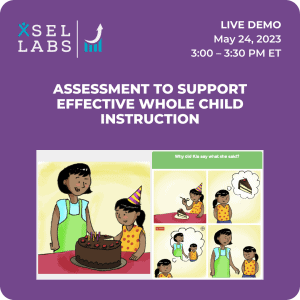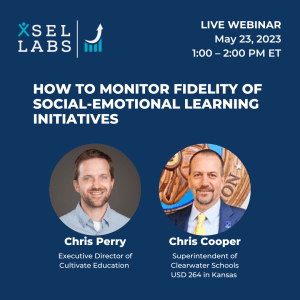Why do you believe the SEL field is gaining momentum, and how do you hope the upcoming SEL Exchange captures and advances that momentum?
First, it is pretty universally accessible—most people can grasp the kinds of competencies it takes to develop relationships, interact effectively with others, be part of a team, and participate successfully in school and life. These are competencies everyone lives out every single day, so there’s an immediate and personal connection. Second, most people would agree that it is a good thing to develop these competencies. Even skeptics of SEL in schools would be hard-pressed to say it’s not a good thing to develop social and emotional competencies. Third, K-12 educators have always to some degree focused on SEL, even if they didn’t call it that. SEL gives us a common vocabulary to talk about the competencies we want our students to develop, in addition to academic competencies. Fourth, it’s increasingly clear that these are teachable skills, and that teaching them benefits students in all kinds of ways, including academically. Finally, the field of SEL has done a good job of developing and summarizing compelling evidence that SEL competencies matter, that they can be taught, and that doing so has all kinds of benefits.
What is the project or initiative you’re working on that you’re most excited about?
My colleagues and I have been focused on developing, testing, and distributing high-quality social and emotional competence assessments. More and more, educators and others recognize that if we want to teach a skill, it is really helpful to be able to assess students’ level of competence. If we agree that SEL is teachable, then just like with reading and math, we’d better figure out how to measure SEL. There is a growing number of assessment options. Quality is improving. And several groups, including CASEL and the Buros Center in Nebraska, are engaging in serious discussion about how SEL assessments can support teaching and learning, and developing guidance to the field on the responsible uses of SEL assessments.
At the SEL Exchange, you’ll be leading and participating in breakout sessions focused on SEL frameworks and assessment. Can you give a sneak peak of a few insights you’ll be sharing in October?
I’m running a workshop on social and emotional data use. Participants will learn about the different kinds of SEL assessments, how they can be used to advance practice, and how to establish effective assessment data use practices. I’m also participating in a panel on the state of the field of SEL assessment—I am lead author on a report on that subject, and we’ll be talking about where we’ve come as a field and what we need to do to ensure that policy, practices, and assessment support one another and, ultimately, that they support teaching and learning.
What is one must read book or resource recommendation for educators and SEL field-builders from your library?
Indulge me in a self-serving moment: I recently published Assessing Students’ Social and Emotional Learning: A Guide to Meaningful Measurement. Admittedly, I’m biased, but the book provides accessible and practical guidance on SEL assessments. It’s not just about tests. It’s about how to decide what to assess, clarify assessment goals, select the right tool for the job, and establish effective data use practices.
Originally published on SEL Exchange Speaker Blog.



